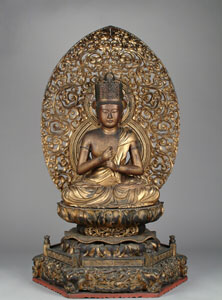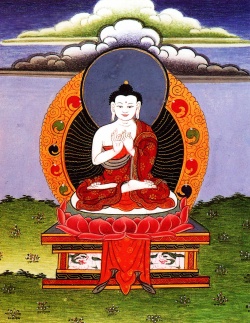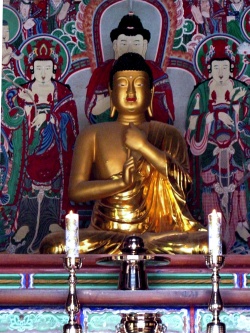Teachings of the Vajrasekhara Sutra (Kongocho-kyo)
The Vajrasekhara (Kongocho-kyo), along with the Mahavairocana Sutra (Dainichi kyo), are the basic sutras for Shingon Buddhism. In Shingon Buddhism faith is propagated with these two great sutras forming the two wheels of a cart.
Kobo Daishi?s teacher, Master Hui-kuo (Keika) of the Blue Dragon Temple in Chiang-an of T'ang China, consolidated the Esoteric Buddhism based on the Dainichi-kyo with that based on the Kongocho-kyo, and Kobo Daishi received the entirety of these two lines.
Like the Mahavairocana Sutra (Dainichi-kyo), the Vajrasekhara explains the teaching of becoming a buddha in this body, which is the central doctrine of Esoteric Buddhism. Its formal title is "Sutra of the King of the Great Teaching Attested to in Mahayåna Bearing the Truth of All the Buddhas at the Vajra Peak." As expressed in this title, this sutra teaches the process by which the thirty-seven deities of the Vajradhatu Mandala actually embodied the truth of becoming a buddha in this body.
Therefore, as contrasted to the Mahavairocana Sutra, which is the sutra for the aspect of teaching the fundamentals of doctrine, the Kongocho-kyo is considered to be the sutra for the practical aspect that teaches the practices and the process for actually becoming a buddha.
Central to the Kongocho-kyo is what is called "the Meditation for Attaining the Buddha's Body in Five Aspects," which is a process of practice and a method for becoming a buddha in this body. This is also referred to as "Attaining the Buddha's Body Through Five Transformations," or "Attaining the Buddha?s Body Through the Five Methods."
They are presented here as follows.
1.Getting in touch with the basic mind.
This is the self-realization that we have the mind that aspires to be enlightened within our hearts.
2. Putting into practice the mind that aspires to realize enlightenment.
This involves the cultivation of the mind that aspires to be enlightened so that it gradually becomes pure and is enlarged.
3. Attaining the Vajra Mind.
As a result of cultivation, the mind that aspires to be enlightened becomes firm and hard like a Diamond gemstone.
4. Attesting to the Vajra Body.
This involves the realization of the Buddha nature that is within the mind and body, the attainment of an indestructible body, and becoming a Bodhisattva who always saves living beings.
5. The perfect fulfillment of the Buddha's body.
This is called the Vajra State of Mind in which our own minds and bodies come to share the same essence as that of the Buddha, and by attaining eternal enlightenment we conclude the process of becoming a buddha in this body.
Even by looking only briefly at the central doctrines of the Kongocho-kyo, we can understand the general essence of the teaching of Shingon Buddhism. The source for faith in and the teachings for fully developing our minds and bodies as the life of the Buddha is explained in the Kongocho-kyo. Certainly the fundamentals for the belief in the life that gives life are to be found here.


